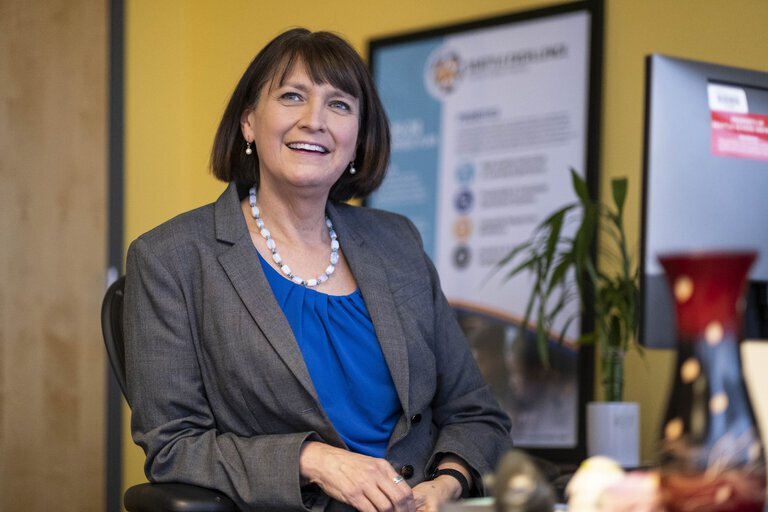Resignation introduces variety of changes amid a difficult school year
Sam Rainville, News Editor
Originally published March 26, 2021
Courtesy of Dean Rutz/The Seattle Times
Superintendent Denise Juneau plans to resign June 2021
Superintendent Denise Juneau stated in an email to Seattle Public Schools faculty that she will not be renewing her contract with SPS. After serving as Superintendent for 2 ½ years, she plans to resign at the end of June 2021 when her contract expires.
Juneau spent the bulk of her email appreciating what she and the school district were able to accomplish while she was in office. She explained her goal to introduce anti-racist policies in SPS schools, and her pride in some of the effects of this goal, such as the work done in partnership with the Office of African American Male Achievement, her push for “educator diversity” and the increased graduation rate for students of color.
Additionally, Juneau applauded the work of educators throughout the district throughout the current COVID-19 pandemic, as well as sharing her appreciation for the technological donations SPS received from corporations like Amazon and Alaska Airlines. She also mentioned the success of the Seattle Promise Scholarship, the program that provides two free years of college to all SPS high school graduates.
Juneau ended her message by saying she plans to continue working with SPS as the new Superintendent takes their position, as well as sharing her hopes for SPS’ future.
“I stand ready to assist the school board as they choose the next person to lead the district and build on our legacy of success,” Juneau said in her email. “I hope that the next leader of SPS is able to lay down roots in this beautiful, resilient city and build on the vision of a more just and equitable school system for our great community.”
While Juneau used her message to faculty to appreciate what she has accomplished, there wasn’t much acknowledgement of the controversies that have surrounded her term.
Both regional and local branches of the National Association for the Advancement of Colored People (NAACP) have criticized Juneau’s response to racism within the district. Washington’s NAACP Youth Council, a student-led branch of the NAACP that advocates for anti-racist action, policies and education, called for new leadership in their article, “Why we, the NAACP Youth Council, are demanding Superintendent Denise Juneau’s termination.”
Senior Eric Anthony Souza-Ponce is a member of the NAACP Youth Council, and one of the writers of the article. He explained in an interview some of the reasons behind the group’s statement against Juneau.
“She was very outspoken about wanting to help underprivileged students, students from marginalized populations, particularly with an emphasis on students of color. . . And initially we were quite optimistic about that,” Souza-Ponce said. “But time and time again, not only has she failed to fulfill any of these promises, she has actively undermined those who sought to do so.”
Souza-Ponce explained that one way Juneau undermined anti-racist action was by working against the Youth Council’s push for Ethnic Studies to be integrated into SPS curriculum. Even more concerning was Juneau’s response to even more serious situations.
“She’s helped to cover up some major instances of abuse in Seattle Public Schools,” Souza-Ponce said. “Instances of abuse such as teachers physically assaulting Black and Brown students, putting them in cages, literal cages, and this just came out recently in the last few months that she helped to cover these up.”
Souza-Ponce explained that one of the dangerous aspects of this action is that it allows these perpetrators of abuse to keep their jobs.
“Everyone would know about the teachers and that would go on the record.” Souza-Ponce said. “Instead it’s covered up so that these teachers can still work in both Seattle Public Schools and in Washington schools in general.”
Souza-Ponce also explained that while NAACP Youth Council members were given the chance to provide feedback, some going as far as joining Juneau’s Student Advisory Board, members were rarely listened to.
“Many of our members were on a committee that she had put together to kind of look over her shoulder and give her more of a student perspective,” Souza-Ponce said. “But from the way she disrespected them and did not value them, almost everyone in that committee left that committee over the summer.”
Souza-Ponce explained that there were times she came to meetings and heard what students had to say, but in the end the changes the Youth Council wanted to see weren’t seriously implemented. Ultimately, the push for resignation was an action the Youth Council found necessary.
“For me and for I think most members of the NAACP Youth Council, this isn’t a matter of she never did anything good,” Souza-Ponce said. “It’s a matter of ‘did the good things that she did outweigh the bad things that she did’, and for us the answer is definitely a no.”
For SPS staff members, there’s more insight into Juneau’s decision available. India Carlson, botany and horticulture teacher, gave her perspective on the Superintendent’s announcement.
“She has basically said ‘I can’t do my job if the school board’s not going to back me fully.’ But it’s also the school board’s job to ask hard questions,” Carlson said. “That’s their job; to actually ask ‘what are you going to do about x, y and z problem?’ That is what they’re supposed to do.”
To Carlson, SPS’ overall trend of high superintendent turnover is frustrating.
“I’ve seen so much churn in superintendence that I am not really excited one way or the other, because it’s very hard I feel to make a really concerted effort to change things and make things better if you’re not going to stick around,” Carlson said.
“One of the things that for me is frustrating, for whatever reason, the way we hire superintendents we don’t hire with a long vision, or maybe it’s just the nature of the job,” Carlson said. “It just feels to me that it’s really hard to put a program in place, put the supports necessary for that program and then actually see results for that program if your leadership changes.”
Carlson explained that this loss of leadership negatively affects teachers and other staff members trying to introduce new ideas.
“At schools, people in the trenches are actually trying to enact those changes but then you don’t know if you’re going to have support next year,” Carlson said. “You don’t know if there’s going to be support from the district or funding for any of those things. There is nothing worse than putting your time and energy into trying to build something and then suddenly you find out ‘oh, that’s not going to happen.’”
Following Juneau’s upcoming resignation in June, SPS will have an interim superintendent, Brent Jones, who has a doctorate in educational leadership, until June 30, 2022. Carlson and Souza-Ponce are both optimistic in Jones’ leadership, and shared their hopes for the superintendent that will follow him.
“There has been a really big shift within the teacher’s union I feel like in the last three years, especially in being much more interested in abolitionist, anti-racist teaching,” Carlson said. “I think that we could leverage that to actually shift and move things in our district really significantly, and I think that would be really exciting. I would love to see somebody who’s going to do that.”
Souza-Ponce added that student input on the superintendent following Jones would be an improvement.
“I don’t know if positive change will come just by her [Juneau] resigning, but I think that it opens the door for positive change,” Souza-Ponce said. “The interim superintendent we have been very optimistic about, and organizers that we work with have also been optimistic about him. I’m hoping that also there can be students of color who can have a say and help decide who the next superintendent is. That way we can have our voices be heard in making this decision that has such a profound impact on all of us.”
Juneau’s term was not without its controversy, and her resignation is bound to stir up more. As of now, the district’s future is fairly unknown, especially since the next superintendent won’t be in power until a year after Juneau’s resignation.
On Juneau’s part, it’s worth acknowledging the significance of her election in the first place. As the first Native American superintendent for SPS, she hopefully is an example of continued progress.
Near the end of her email, Juneau expressed her gratitude for her position.
“I am honored to have had the opportunity to lead and learn here,” Juneau said in her email. “I will carry the spirit and lessons of this community and experience with me, and hope that our time spent together has helped strengthen the foundation for the continued growth for all our truly remarkable students.”
Sources:
Seattle Times: “Seattle Public Schools Superintendent Denise Juneau will resign in June”
Seattle Times: “Reactions to Seattle schools chief Denise Juneau’s resignation are mixed”
South Seattle Emerald: “Why we, the NAACP Youth Council, are demanding Superintendent Denise Juneau’s termination”
Seattle Public Schools press release confirming Brent Jones as interim superintendent:
KUOW, “Locked in ‘the cage.’ Report finds disturbing discipline measures at Seattle school”
NAACP Youth Council website:

























